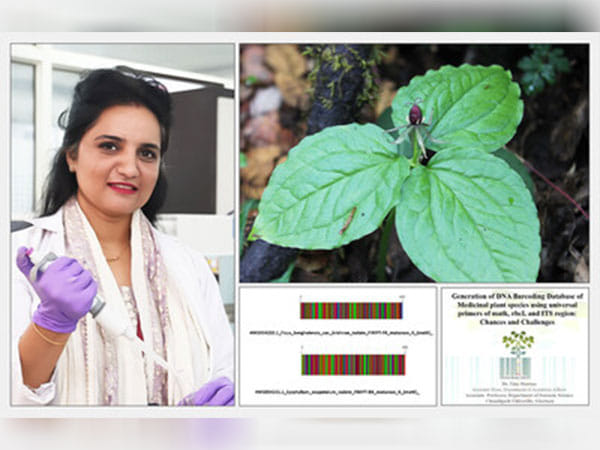PRNewswire
Mohali (Punjab) [India], August 2: To prevent excessive illegal extraction and smuggling of the endangered medicinal herb — Nag Chhatri (Trillium govanianum) to quench the never-ending thirst of the pharmaceutical industry, a Chandigarh University researcher, as part of a joint study, has developed unique DNA genetic barcodes, which would be instrumental in combating the smuggling and illegal trade of Nag Chhatri, a high-value and rare plant on the verge of extinction.
On the basis of the joint study, conducted by Dr. Tina Sharma, Associate Professor, Forensic Science Department, at Chandigarh University and Professor Mukesh Kumar Thakkar, Head of Forensic Department, Punjabi University, Patiala, the two researchers have established three DNA genetic barcodes — matK, rbcL, and ITS — for Nag Chhatri (Trillium govanianum).
These barcodes will not only help in ensuring that trafficked plants get accurately recognized but also help detect substitutions in the market, preserving the integrity of the species and supporting conservation efforts.
Chandigarh University’s Dr. Sharma and Punjabi University’s Prof. Kumar have published their study on the Trillium govanianum plant (Nag Chhatri) in the renowned journal Forensic Science International: Animals and Environments and also got the approval (received Accession Number) for these barcodes from National Center for Biotechnology Information (NCBI), United States of America (USA); now, it’s available for public use and further research on the subject.
Chandigarh University’s Associate Professor, Dr. Tina Sharma, said, “The availability of these genetic sequences will aid police administration in identifying smuggling consignments of Trillium govanianum (Nag Chhatri), ensuring that trafficked plants get accurately recognized. Additionally, these genetic barcodes will help detect substitutions in the market, preserving the integrity of the species and supporting conservation efforts. On one hand it would be instrumental in curbing the crime, and on the other hand it will help conserve the environment.”
“In the present scenario, due to lack of molecular identification data and facilities in forensic science laboratories, most of the wildlife cases, especially those related to medicinal plants, face inaccurate authentication issues and fail to prove in the court of law. DNA barcoding holds the potential to conduct species-level identification, if used as an effective complement to the traditional morphological identification methods,” Dr. Sharma added.
Satnam Singh Sandhu, Member of Parliament (Rajya Sabha) and Chancellor, Chandigarh University, said, “Research and innovation has always remained an integral part of the academic ethos nurtured here at Chandigarh University, and this ground-breaking innovation of genetic barcodes by a CU researcher will go a long way in curbing the smuggling of the rare and endangered Nag Chhatri herb and save many lives. Apart from the state-of-the-art laboratories in different departments, Chandigarh University has 30 Industry-sponsored Advanced Research Labs and 32 Centers of Excellence established by leading MNCs that empower students with real-time practice and industry experience. CU hosts India’s first real-time ground station at the Kalpana Chawla Centre for Research in Space Science and Technology.”
“Moreover, it has a vast International Research Network, with more than 502 universities in over 95 countries. To further encourage research on the campus, the university has reserved a budget of Rs. 15 Crore this year. In the last ten years, the students and faculty of Chandigarh University have filed 2613 patents in the fields of Engineering, Sciences, IT, and Healthcare, out of which, more than 130 filed patents are of students from Punjab. In 2021-22, Chandigarh University set a new record by filing 703 patents, establishing itself as the highest patent-filing institution in the country within a single year.”
Nag Chhatri grows at a high-altitude area between 2700 metres to 4000 metres (above sea level), in Jammu & Kashmir and Himachal Pradesh, in the mountainous Himalayan region.
To counter the menace of smuggling of this rare herb, researchers have developed unique DNA genetic barcodes, which would be instrumental in combating the smuggling and illegal trade of Nag Chhatri in these two hill states.
Forensics and laws protecting herbs/medicinal plants need overhaul
Associate Professor Dr. Tina Sharma added, “While there are adequate provisions in the law for the protection of wildlife (animals), there is limited scope in terms of forensic science research, which can make significant contributions for the conservation of herbs. We need more laws and overhaul of the existing ones, coupled with their strict enforcement, to ensure that the biodiversity and ecological balance of our environment stays intact,” added Dr Sharma.
About Chandigarh University
Chandigarh University is a NAAC A+ Grade University and QS World Ranked University. This autonomous educational institution is approved by UGC and is located near Chandigarh in the state of Punjab. It is the youngest university in India and the only private university in Punjab to be honoured with A+ Grade by NAAC (National Assessment and Accreditation Council). CU offers more than 109 UG and PG programs in the field of engineering, management, pharmacy, law, architecture, journalism, animation, hotel management, commerce, and others. It has been awarded as The University with Best Placements by WCRC.
Website address: https://www.cuchd.in/
Photo: https://mma.prnewswire.com/media/2474501/Tina_Sharma_Chandigarh_Uni.jpg
(ADVERTORIAL DISCLAIMER: The above press release has been provided by PRNewswire. ANI will not be responsible in any way for the content of the same)
This story is auto-generated from a syndicated feed. ThePrint holds no responsibility for its content.






